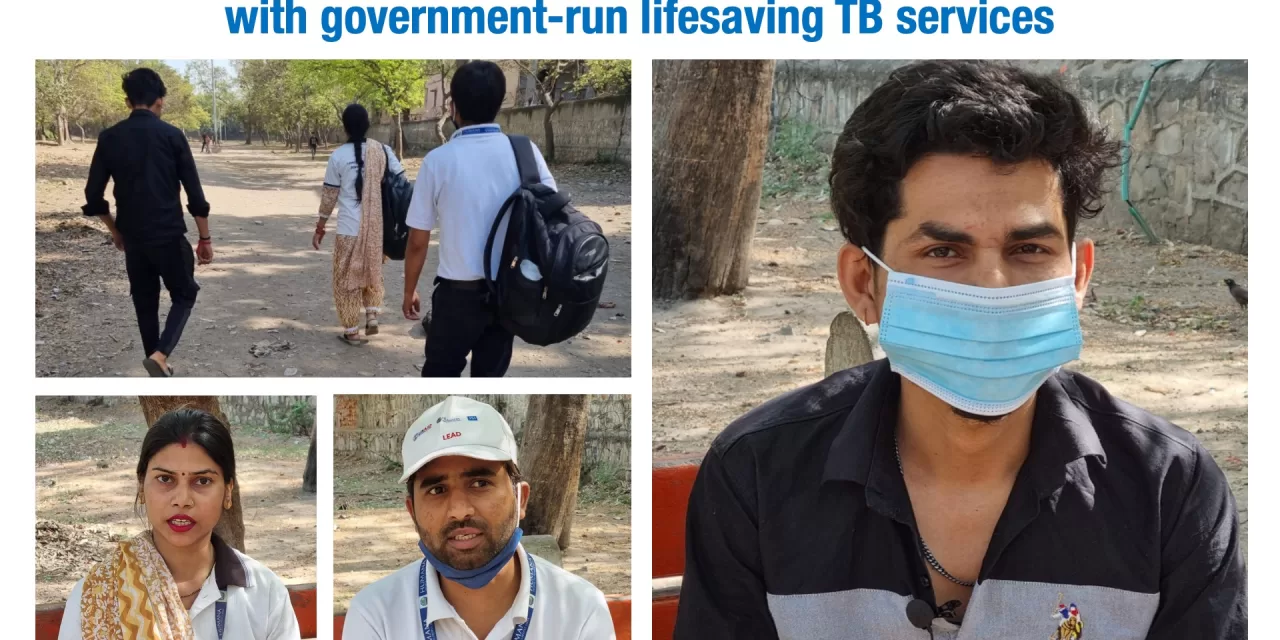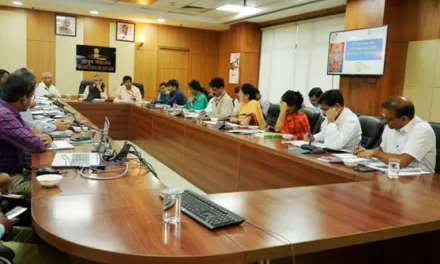If we assume that a person who lives a few hundred metres away from one of the best TB clinics would have no problems in accessing services, then we could be in for a rude shock.
Despite getting diagnosed with TB in a government hospital Deepu – a migrant worker -failed to access treatment on his own. He gave up his efforts after several futile visits to the healthcare facilities – largely because of lack of any clear help or guidance on where to seek treatment– while his health condition worsened (and infection could have spread to others).
Two months later (after his diagnosis), when a community health worker found him during her routine screening of people who are at higher risk of TB, he was eventually able to receive TB treatment along with nutritional and financial help provided by the government of India. He finally completed his treatment and got cured, thanks to the continuous support and motivation by the health worker Ms Pinki. Since then, he has helped bring many more people to TB treatment and care-fold.
When CNS went to meet Deepu at his place, it was humbling to see the ground realities: the person lived almost behind one of the finest TB and chest clinics in Delhi- Gulabi Bagh Chest Clinic. And yet he was unable to access treatment, before a community healthcare worker stepped in. This real testimony underpins the critical importance of frontline healthcare workers and the model of Humana People to People India which they help implement with utmost sincerity in finding TB among the most vulnerable populations – and link (and support) them with government-run TB services.
There’s many a slip ‘twixt the cup and the lip
Deepu hails from Jaunpur in Uttar Pradesh, India who migrated to Delhi in search of livelihood and began working in Gulabi Bagh area as a garment worker. Deepu lives behind Gulabi Bagh Chest Clinic with his wife and one small child (aged one year and a half). His wife, who appeared weak, was pregnant with a second child when we had met him last year.
Deepu told CNS: “I remember it was around midnight on a hot summer day (in 2023) when I coughed blood. In the next few days I also developed fever. I thought it could be due to the searing summer heat. When blood in my cough persisted and the amount of blood also increased, then I went to a government hospital (Deep Chand Bandhu Hospital) for a checkup.”
Deepu was diagnosed with TB but was not able to find the way forward to linkage with TB treatment and care. After multiple visits to hospitals and being footballed from one place to another, he gave up looking for treatment. He had lost all hopes of getting cured of TB.
Journey from diagnosis to cure
But then came Ms Pinki Sharma and Mr Sunil, both are frontline healthcare workers, who serve as field officers with Humana People to People India (HPPI). One day, as Pinki was doing her regular TB screening rounds in the neighbourhood, Deepu’s wife spotted her, told her about her husband’s condition and sought her help. Pinki went to their place and counselled Deepu to accompany her to get a TB test. Deepu shared all his health problems with Pinky but did not mention to her that he had already taken a TB test almost two months back.
When Pinki took him for a chest X-Ray (done in a private facility where cost is covered by HPPI) and a TB confirmatory microscopy sputum test at the government-run Gulabi Bagh Chest Clinic in Delhi, she learnt from a healthcare worker about Deepu’s previous TB diagnosis. When TB diagnosis is confirmed in a government-run facility in India, then a unique identification number called Ni-Kshay ID is created. Deepu’s Ni-Kshay ID was already existing in the system.
Deepu’s X-Ray was presumptive for TB, sputum test was negative, and when evaluated clinically by a medical expert, TB disease was confirmed and treatment initiated. Deepu’s samples were sent for a special test to check if the medicines used in his treatment were effective against the TB bacteria that infected him. This test is called drug susceptibility test done by Line Probe Assay or LPA. Deepu had no diabetes. But he did consume alcohol.
Due to his alcoholism, the treating doctor was not convinced if he would adhere to TB treatment. Pinki and Sunil convinced the doctor that they would follow up with Deepu and support him in all possible ways to ensure he completes the therapy. His treatment began in September 2023- within a week of getting diagnosed this time.
Pinki also took his wife for a chest X-Ray and a TB microscopy test which ruled out active TB disease.
Another major help Pinki offered was to facilitate linkage of Deepu’s bank account with government-run schemes so that he could receive Rs 500 per month during the entire duration of treatment. Deepu also received nutritional support. Now, the Indian government has increased the monthly support from Rs 500 to Rs 1000 for every TB patient during the treatment duration.
Deepu was initially reluctant to take the medicines but with Pinki’s continuous motivation and counselling on the importance of adhering to the full 6 months course of TB treatment he began the journey. Pinky and Sunil also encouraged him to stay away from alcohol.
Pinki followed up daily with Deepu to help him with any problems or issues he might be facing regarding treatment adherence.
Deepu was very reluctant to go by himself to collect his TB medicines from the clinic– largely due to his past unpleasant experience at other public medical facilities. So, every time he had to go to get his medication, he would call Pinki to come in-person to the clinic and collect his medicines for him. And this she did for the entire duration of his therapy.
When the going gets tough, the tough gets going
But adhering to TB treatment for six months was not without hiccups. Three weeks after being on treatment, one night Deepu called Pinki that he had thrown his medicines away in a fit of rage as his wife was not giving him any food to eat because he had fought with her. Pinky went to his house and counselled the couple as if they were her family members. She told them that while disagreements do happen between couples most often they do not last for long. But if Deepu does not take medicines and his health deteriorates then all of them would suffer. The TB bacteria might become resistant to medicines, which would prolong the TB treatment and make it more difficult. So, it was in everyone’s interest to take the medicines regularly and get cured.
Deepu agreed on condition that Pinki should be there with him at the hospital when he goes to take the medicines. She took him to the clinic again and requested the healthcare officials to help with the medicines. After that incident he never faltered on his treatment.
Gaining the confidence of one leads to find others with TB
Once when Pinki visited Deepu for a follow up during his treatment, his wife requested Pinki to speak with her brother Vikki who had some TB symptoms – cough and weight loss- and he was also dealing with alcoholism (some said he injected drugs too).
When Pinki went with her to meet Vikki, he initially refused to speak with her. But after some efforts Pinky managed to convince him to get tested for TB. Vikki’s chest X-Ray was presumptive for TB and molecular test was positive for TB disease. He was put on TB treatment.
Vikki took medicines for around two months before discontinuing them. Perhaps some reprimand by the healthcare worker for his alcoholism had led to some bitterness. When Pinki learnt about it, she counselled him again to stay away from alcohol and complete the therapy. She convinced him to go with her to the clinic and requested the healthcare worker to help. Upon Vikki’s insistence, Pinki had to go in-person every time to the clinic when his medicines were to be issued. She collected them and gave it to him for the remaining duration of the treatment.
“The clinic is not very far from where they live, it is hardly a five-minute walk,” she said. But often even a small distance could become difficult to traverse through, for a variety of reasons.
All advocacy is, at its core, an exercise in empathy
“All advocacy is, at its core, an exercise in empathy,” had said Samantha Power, former US ambassador to the UN.
Empathy is what makes a difference in supporting people in need.
Deepu told us that he feels Pinki is like an elder sister to him. Pinki too treats him like her brother and his wife as her sister-in-law.
Deepu finished TB treatment in March 2024. He is back to work and has gained back his strength. Deepu confirmed that he did not face any kind of discrimination in the community he lives in or at his workplace. We found him wearing a mask when we met him- perhaps as a result of counselling on infection control by Pinki and Sunil.
“People with TB must understand that it can infect any one of us. I had no one in my family who had TB before. It can happen to anyone. But if one sticks to the treatment and completes it, then it is possible to get cured,” said Deepu.
“That is why I go to the health awareness camps,” he said. Deepu has mobilised many people to come forward to take a TB test. Few are already on treatment, thanks to him.
“We end up spending so much on private health clinics, but TB services are free in government ones,” reflects Deepu.
“I am grateful to God that I met Pinki madam, she came to my place, and I went with her to get tested and treated. I am fine now. I feel good, I feel fit, eat well and work normally,” he said.
Pinki and Sunil credit the organisational trainings and support of Humana People to People India, their supervisors, and the mentoring they have received to help support people most-at-risk of TB, and a range of other people and stakeholders who are pivotal to find all TB, treat all TB and prevent all TB among those who are most likely to be left behind.
This is just one of the many heart-rending stories of ground realities that put people at risk of TB, challenges that block access to care and services, and hope that comes from frontline workers (backed with models like the one developed by Humana People to People India) who are making a huge difference in bridging the gap between the people most-in-need (and most likely to be left out) and the existing public services.
TB services are free of cost in India’s public health system, and government TB clinics are doing great work in diagnosing and treating TB. But we do need trained community healthcare workers-the likes of Pinky and Sunil- powered by models like of Humana- to complement the work of government health personnel, in our quest to #FindAllTB, #TreatAllTB and #PreventAllTB.
Shobha Shukla – CNS (Citizen News Service)












